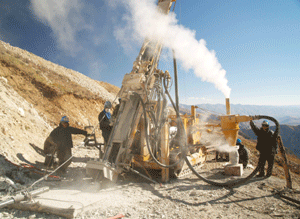Regulatory and clearance delays may be necessary evils in infrastructure projects, especially those under PPP. But as N Muruganandam, Joint Secretary, Union Ministry of Shipping, elaborates the government's ambitious plans of port infrastructure development in the coming years may also be accompanied by some ironing out of those issues.
FlashNews:
Air India, Lufthansa Group Ink Landmark MoU to Boost India‑Europe Connectivity
GMRIT Achieves Deemed University Status, Strengthens Academic Expansion
India Adds Record 52.5 GW Power Capacity in FY2025‑26, Driven by Renewables
REC to Drive AI‑Powered Energy Innovation at India AI Impact Summit 2026
Inox Clean Energy, RJ Corp Enter Africa’s IPP Market, Target 2.5 GW by FY2029
Best Pills for Erection: Myths, Facts, and Smart Choices
Best Pills for Erection: Audience‑Specific Guidance with Safety Disclaimers
DIAL Launches Family@DEL: First Family‑Centric Travel Initiative at an Indian Airport
India’s SDHI Lands Landmark Oman Defence Ship Deal
Air India Unveils First Line‑Fit Boeing 787‑9, Signals Bold Global Transformation in 2026
Vizhinjam Expansion Strengthens India’s Maritime Competitiveness: Sonowal
Tata Power Odisha Discoms Secure Top National Rankings for Third Consecutive Year
SDHI Secures $227 Million Chemical Tanker Deal, Revives India’s Commercial Shipbuilding
India’s Energy Transition Sets Global Pace: Pralhad Joshi at Davos
IWDC Clears ₹15 Billion Projects to Boost Green Mobility, Cargo and River Tourism
World Bank Approves $815 Million Financing for Tata Power-DGPC Dorjilung Hydropower Project in Bhutan
Indian Railways Deploys Humanoid Robot ASC ARJUN at Visakhapatnam for Smart Station Security
India’s Power Grid Crosses 500,000 Circuit Km, Marks 71.6% Growth Since 2014
India Inc Optimistic on Growth, Flags Infrastructure, Defence and Export Priorities: FICCI Survey
Revenue model needs to change
In the revenue sharing model, an investor who is investing in the port project should also get some comfort level in the initial years, says Umesh Grover, Group Executive Director, Shipping & Infrastructure, SKIL Infrastructure. There has to be a gestation period but as the cargo increases, the proportion of revenue share should also be increased.
When we finally hit the target?
Missing Maritime Agenda targets has been the norm. But now, the Shipping Ministry is pushing the much needed expansion of its severely congested ports with some urgency, even as the new targets for the year have been announced. As major ports are losing their lure with investors,
The UN is wrong
Can governments effectively control over the private sector and ensure foolproof PPP project planning and delivery? The environment community has a reason to say I-told-you-so. More people (estimated over 5,500) have died in the Uttarakhand disaster than in the 9/11 attacks.
Exploring new options
The exploration capacities of PSUs and the state governments are almost utilised. Dilip Kumar Jena and Bhavesh Singhavi recommend why we should study the best practices in Canada and other mining-rich countries while engaging the private sector.
Needed: Shot in the arm
There was hardly any investment in the mining sector despite the sector was opened up for 100 per cent FDI in February 2000. There is an urgent need to find out ways and means to attract private investment in exploration because government agencies have not been able to find resources
Modern mining equipment will be a key success factor
Equipment companies would like to see better procurement methodologies which are technology-driven rather than just low capital cost-oriented, Somnath Dutta Majumdar, Business Line Manager-Drilling Solutions, and Anirban Sen, Business Line Manager-Underground Rock Excavation, Atlas Copco
Only a transparent delivery system can attract FDI
India's resource governance system needs to ensure allocation of iron ore resources to all the steel producers, so that effective value addition can happen within the country and India will be less dependent on import of finished steel,
Better capacity utilisation is needed
Given the present globally competitive environment, the mining industry must work on new financial strategies, aggressive exploration development programmes, investment-friendly policies and regulatory framework, value addition of minerals and the use of productivity enhancing techniques
TAMP as market regulator
Minor ports have emerged as more attractive to private investors than the major ones, notably after the controversial TAMP revised tariff as PPP projects at major ports are marred by litigations, delays and disputes.




